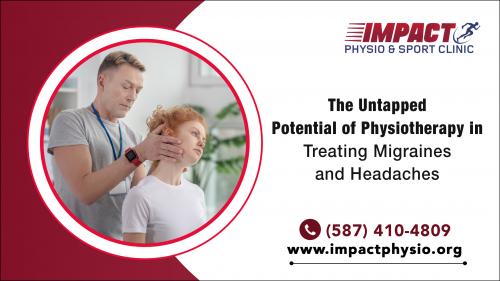The Untapped Potential of Physiotherapy in Treating Migraines and Headaches

The world of medical treatment is continuously evolving, with physiotherapy emerging as a key player in areas once dominated by medication and surgery. Among these areas, managing migraines and headaches represents a field ripe with untapped potential for physiotherapy interventions.
Beaumont physiotherapy, known for its holistic and patient-centred care, is increasingly recognizing the efficacy of physio for migraines and headaches. This approach addresses the symptoms and delves into the root causes of these conditions, offering patients a comprehensive treatment strategy that goes beyond temporary relief. As awareness grows, more individuals are beginning to explore how physiotherapy in Beaumont can offer new hope and solutions for those suffering from chronic migraines and headaches, opening the door to improved quality of life and well-being.
Causes of Migraines and Headaches
Poor Posture: Prolonged poor posture, especially related to desk jobs or frequent use of devices, may result in stiffness and discomfort in the neck and shoulder areas, contributing to tension-type headaches and migraines.
Muscle Tension: Tightness in the neck, shoulders, and upper back muscles, often resulting from stress or poor ergonomics, can trigger headaches.
Joint Dysfunction: Dysfunctions in the cervical spine (neck) joints can limit movement and cause pain that radiates into the head, leading to cervicogenic headaches.
Stress: High levels of stress can increase muscle tension and trigger migraines and tension headaches. Physiotherapy often includes stress management techniques to address this trigger.
Sedentary Lifestyle: Insufficient physical activity can aggravate musculoskeletal problems, potentially resulting in more frequent and severe headache episodes.
Poor Sleep Habits: Insufficient or poor-quality sleep can trigger and result in migraines and headaches, creating a cycle that physiotherapy aims to break.
Environmental Factors: Certain environmental stimuli, such as bright lights, loud noises, or strong odour, can trigger migraines in susceptible individuals. While physiotherapy cannot change these triggers, it can help patients develop coping strategies.
Dietary Factors: Some foods and beverages (e.g., caffeine, alcohol, and aged cheeses) are known migraine triggers. Physiotherapists may collaborate with dietitians or provide general advice on avoiding these triggers.
Techniques for Treating Migraine and Headache Physiotherapy
Physio for headaches and migraines in Beaumont utilizes a comprehensive evaluation to identify the physical and lifestyle factors contributing to headaches. Treatment plans are structured to address these specific triggers.
Manual Therapy Techniques
Cervical Mobilization: This involves gentle movements and stretches of the neck joints to increase mobility, reduce stiffness, and decrease the nerve irritation that can contribute to migraines and headaches. It is especially beneficial for those whose headaches stem from neck stiffness or dysfunction, a common issue in today's sedentary lifestyle.
Trigger Point Therapy: This therapy targets specific points within the neck and shoulder muscles and applies direct pressure to release muscle tension. It's effective for tension headaches and migraines caused by muscular strain, especially in the neck and shoulders.
Exercise and Movement Strategies
Physiotherapy for tension headaches involves these exercises.
Neck and Shoulder Strengthening: Strengthening exercises for the neck and shoulders are designed to build muscle support, fostering proper posture and minimizing strain. Such strain, if unaddressed, is a known precursor to tension headaches.
Stretching Exercises: Flexibility in the neck and shoulders is crucial for preventing tightness and tension. Stretching exercises enhance mobility in these areas, offering a proactive approach to ward off common triggers of tension headaches and certain migraines.
Postural Correction and Ergonomic Adjustments
Posture Correction: Maintaining optimal posture is crucial for distributing the body's weight evenly across the musculoskeletal system and minimizing stress on any single structure. Improved posture helps in aligning the spine correctly, relieving undue stress on the neck, shoulders, and back. This alignment reduces the muscle tension that often leads to tension headaches, providing a non-pharmacological method to manage and prevent headache episodes.
Ergonomic Adjustments: Adjusting one's workstation to promote a healthy posture is key for office workers or for those who frequently work at a desk for extended periods. Simple modifications can significantly diminish the strain that contributes to developing tension headaches.
Stress Management and Relaxation Techniques
Breathing Exercises: Diaphragmatic breathing is taught as a method to induce relaxation and mitigate stress, a common trigger for migraines and tension headaches. This type of breathing enhances full oxygen exchange and can have a calming effect on the nervous system.
Mindfulness and Relaxation Training: Incorporating mindfulness practices into daily routines helps patients manage stress more effectively. Techniques such as meditation, guided imagery, or progressive muscle relaxation can decrease the frequency and intensity of headache episodes by fostering mental and emotional calm.
Dry Needling
For some patients, dry needling is used to address deep muscular tension and inaccessible trigger points through traditional massage or pressure techniques. This involves inserting fine needles into the trigger points, leading to muscle relaxation. This can be particularly effective for chronic tension headaches and migraines where muscular tension plays a significant role.
The goal of headache and migraine physiotherapy is to diminish headache episodes' frequency, duration, and intensity, improving the patient's quality of life.
Unlocking Relief
As we reflect on the journey through the realm of physiotherapy and its role in treating migraines and headaches, it's clear that this therapeutic approach holds a promising future. Impact Physiotherapy in Beaumont provides relief and long-term solutions to those afflicted by these often debilitating conditions. With a commitment to exploring and harnessing the full scope of physiotherapy's capabilities, clinics like Impact Physio in Beaumont are paving the way for innovative treatments that offer more than just temporary alleviation.
For individuals searching for a 'physiotherapist near me,' taking the step to consult with professionals at a physiotherapy clinic can be a game-changer. As more people turn to physiotherapy in Beaumont for their health needs, the future looks promising for those looking for alternative and effective treatment options.
If migraines or headaches have been a constant challenge, consider reaching out to Impact Physiotherapy. Embrace the opportunity to explore a different avenue of care that focuses on your overall well-being and recovery.
Post Your Ad Here
Comments